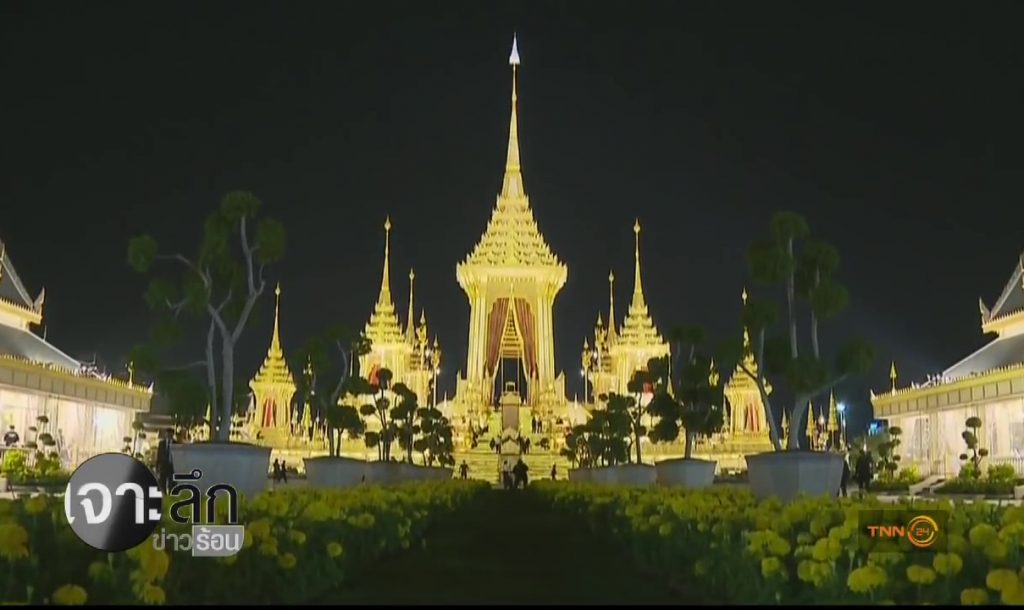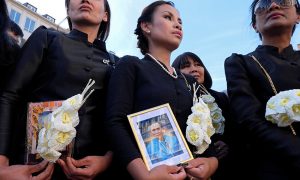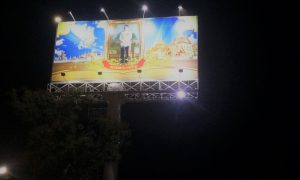The Royal Cremation Ceremony for the late King Bhumibol, held in Bangkok in the past several days, in a way marks the end of a political era in Thailand. For virtually all of our Thai readers and contributors, King Bhumibol has been a constant in one way or another in their lives and work, and New Mandala will be sharing several short reflections by scholars on what this moment means for themselves and for Thailand.
One researcher who asked to be introduced as “a Thai whose whole life has been spent under King Bhumibol’s reign until 13 Oct 2016”, acknowledges the central place of the monarchy in Thai public life, but wonders whether it’s healthy for society to “always cling on to a great king to salvage them from crises”:
“The recent cremation of the late King Bhumibol Adulyadej made manifest the moral authority, reverence and affection that he has achieved after 70 years on the throne in Thailand. The monarchy was at a low ebb when King Bhumibol ascended to the throne, but he has elevated its status to become what many Thais regard as a central pillar of the nation. Some might nevertheless say that this status is a result of decades-long state-sponsored propaganda campaigns, and the face that dissenting perspectives cannot be legally expressed in Thailand.
King Bhumibol’s semi-divine status and unsurpassed moral authority allowed him to wield political influence beyond what is prescribed in Thailand’s constitution. His interventions to end two bloody political confrontations in 1973 and 1992 have been widely cited as exemplars of his distinct cultural charisma in the Thai context. But during the last decade of his life, the King was in frail health while the country underwent the most violent and turbulent political period since the 1932 Revolution. His silence amid the political upheavals that marked the last decade of his reign was interpreted in various ways, and has raised concern over the future of Thai monarchy.
With the passing of King Bhumibol, Thailand is now entering uncharted territory. The 64-year-old Maha Vajiralongkorn Bodindradebayavarangkun, King Bhumibol’s only son, took the throne late last year and is expected to be crowned soon, now that the cremation of his father has taken place. Given the late King’s highly-revered status, it will be an extremely challenging task for the new monarch to attain a similar level of admiration and respect.
Be that as it may, for Thailand to be a mature democratic society, it is healthier for Thais not to always cling on to a great king to salvage them from crises. A society that pins high hopes on an individual–no matter how great he is–sows the seed of its own destruction. It is vital that Thais devote their efforts to strengthen democratic institutions that could deal with new challenges peacefully and effectively.”
This note from another scholar, who asked only to be introduced as “a Thai academic”, expresses dismay at the effects of the consolidation of the “cult of King Bhumibol”:
“The Cremation of King Bhumibol is probably one of the most memorable moments in Thailand’s history. People from all walks of life, all professions, all ethnicities, donned themselves in entirely black clothes—down to umbrellas and other accessories—camped for days to be present along the Royal Procession. Everything was perfectly choreographed. All of this made the final farewell to the beloved king seem a theatrical and sacred occasion. But this love and sacredness are nothing natural. The cult of King Bhumibol was years in making—and the country has had to sacrifice so much to perfect this cult.
It has been a difficult year for Thais in the year since King Bhumibol’s death on 13 October 2016. While many grieved the loss of their great king, others struggled to survive another surge of surreal passion. The country first reacted to the terrible news with shock and denial, then grief and anger. Mobs broke out to hunt for anyone who was too slow to find black clothes or express publicly their love for the late monarch. A few unfortunate individuals were beaten—dismayingly, most of them were mentally handicapped people who were unable to behave properly. As such sentiment died down, acceptance came in. People not wearing black were spared because “they also loved our father, but they could not afford the right mourning costume.” Is it not sad that the society could not debate about the freedom of expression for those who might not sympathise over the death of the king? This is, at best, fake unity.
Throughout the year, propaganda continued as usual. Every aspect of the King’s life was glorified and shared. His long reign rightly meant he had been involved in almost every major event in Thai modern history. Also rightly was that his reign had brought betterment for the lives of millions of Thais. But as the propaganda intensified, the stories became harder to believe. King Bhumibol was depicted as a demigod who solely transformed the country, bringing it to the forefront of Asia. No one else could take, or share, the credit. Some stories were clearly fake, but people were willing to forgive the writers for they brought joy to the hearts of readers. White birds came to pay homage and clouds formed into his image. Bhumibol, many claimed, had reached nirvana. These stories were sometimes produced by the Information Operation unit of the military government, but some of them were written by individuals who genuinely believed that they were offering Bhumibol the service.
To my surprise, I have witnessed many critical-minded, well-educated young people becoming Bhumibol apologists. They are the younger generation of Thais who are well exposed to modern liberal democratic values. Some of them have received the finest education possible in the world. They have lived and worked in the West. I have spent countless hours discussing the future of Thailand with them. Many were able to criticise the socio-economic inequality prevalent in our country, and the problem of the military’s political intervention. Still, they are willing to defend the lavish funeral and herald Bhumibol’s legacy to the western critics. Emphasising on how much Thais love this great man and the service he had done for the country, they overlook the draconian law of lese majeste, the machinations that occur to indoctrinate the love for Bhumibol, and the darker aspects of the late king’s life story.
Thus, the love for King Bhumibol is absolute. Thais cannot celebrate Bhumibol as a great man who fulfilled miraculous tasks, but who erred as any normal human did. Fake news, lies, fallacies, and violence are all justifiable to achieve that end, which produce the mass of royalist automatons. Thais have been constantly belittled by stories of his greatness and reminded that we, weak and worthless, could never achieve anything without his mercy and blessing. But where are we heading to after 26 October 2017? The Cremation Ceremony is hyper-royalism at its finest, as millions of Thais in literally every corner of the world join forces to commemorate Bhumibol’s legacy. Prose and verse, photos, drawings, and songs are beautifully written by thousands of Thais in remembrance of the beloved father of the nation. But even the moon has its dark side. If Bhumibol is our father, then Thais need not look for a problem further than at our elder brother, who only flew back from Germany when the funeral drew close—and brought two mistresses to the event, along with his children, each with his or her own personal problems.
Will the royalist automatons simply be de-hallucinated and normalised? I guess not. The elitist network that has long benefited from hyper-royalism will probably try to utilise the cult to continue to manipulate the country. If so, how will the new King Vajiralongkorn, who is badly in need of building his own legacy, reconcile with the haunting memory of his father’s successes? After seven decades, the royalist moon is finally waxing.”
Do you have a personal, political, or historical reflection on the final farewell for King Rama IX? New Mandala welcomes thoughtful additions to the conversation, and will guarantee anonymity for authors who require it. Please contact our editor at liam[dot]gammon[at]anu[dot]edu[dot]au if you would like to make a contribution.
 Facebook
Facebook  Twitter
Twitter  Soundcloud
Soundcloud  Youtube
Youtube  Rss
Rss 


